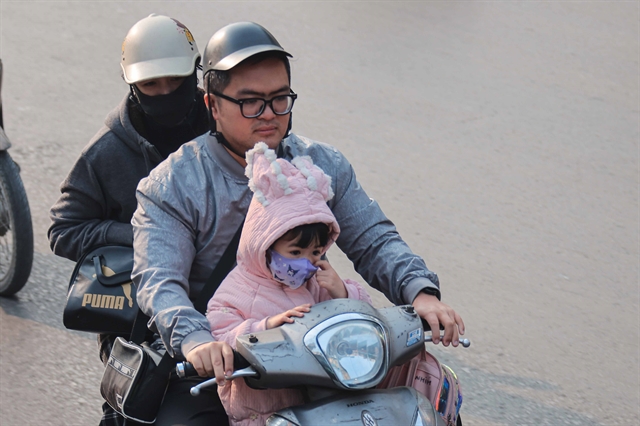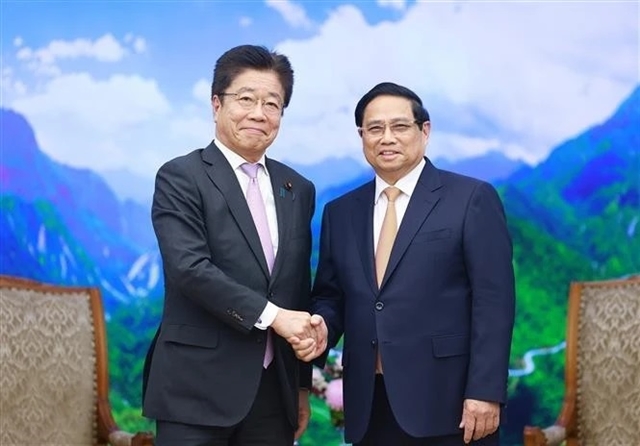

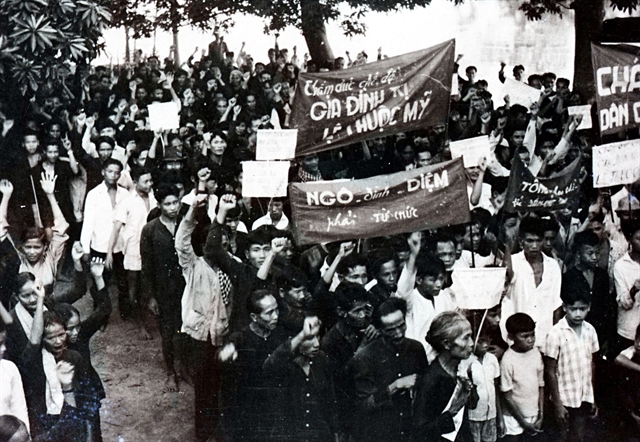
|
| UPRISING: The Đồng Khởi Movement, which originated from Mỏ Cày District, flowed across Bến Tre Province and then throughout the south, to the Central Highlands and other central provinces. VNA/VNS File Photo |
By Phúc Hậu, Hạnh Quỳnh and Hiền Hạnh
In the history of Việt Nam, there was a unique unit that contributed a great deal to the war against the Americans. Consisting entirely of females, the force, known as 'Long-Haired Army', was formed in the Đồng Khởi (General Uprising) that started throughout the South in the 1960s, after the Party Central Committee’s Resolution No15 was issued, combining political and armed struggles.
After the great victory of the Spring Offensive 1975, this Long-Haired Army continued to contribute to building the armed forces, protecting the nation that had recently been reunified.
Such female fighters, despite their small and slender figures, faced immense danger to stop the destruction of villages. They also launched the insurgence of the Đồng Khởi Movement throughout the southern region that became widely known beyond the borders of Việt Nam.
Breaking the enemy’s grip
Việt Nam has now been reunified for 45 years, but 86-year-old Ca Lê Du in Tân Thành Bình Commune in the southern province of Bến Tre is still overwhelmed when she recalls the Đồng Khởi Movement and the Long-Haired Army.
The movement that broke out in Bến Tre before spreading throughout the South was a consequence of accumulated resent, she said.
The US and the US-backed administration of the Republic of Việt Nam under its head Ngô Đình Diệm broke the 1954 Geneva Agreement, making South Việt Nam a new-typed colony and a military base for the American empire. Diệm issued Law 10-59, publicly “placing the communists outside the law”, resulting in the executions of thousands and the imprisonment of even more who were suspected to have communist affiliations, which led to the uprising to break the shackles of the regime.
In Du’s memories, both Vietnamese in the North and the South felt great anguish that the country was divided though peace had been established for about five or six years. Many in the South saw their houses destroyed, were separated from their relatives and resistance activists were killed by the Sài Gòn administration.
“One day, the enemy troops raided and killed 10 young men in the hamlet. Other female neighbours in the commune secretly and hurriedly took the bodies across the river to reach Bến Tre Market by boats before dawn. When the market opened, we critically demanded the enemy stop raiding and killing innocent people,” the female veteran recalled.
The revolutionary movement in Bến Tre and the South in general was hampered by the brutality of the enemy. From 1957 to 1959, 17,000 villagers in Bến Tre were arrested, imprisoned and tortured while hundreds of Communist Party officials and members were killed. From more than 2,000 members, Bến Tre Party Committee then had only about 160 left.
With the revolution in the South drowned in a sea of blood, the anger of the locals reached its climax. A movement to fight terrorism, oppression and anti-communist policy took place across the South, demanding democracy and social welfare.
In this context, Bến Tre Provincial Party Committee decided to start a week under the motto 'Unanimity, Concerted Movement', calling for the villagers to fight against local tyrants, destroy their grip, liberate the countryside and take control of the farms.
Following a plan and under the leadership of female commander Nguyễn Thị Định, who later became the the first female general of Việt Nam People’s Army, the Đồng Khởi Movement began in Định Thủy, Phước Hiệp and Bình Khánh communes of Mỏ Cày District in Bến Tre on January 17, 1960 before diverting to nearby Giồng Trôm, Châu Thành, Ba Tri and Thạnh Phú communes.
About 10 days later, the enemy counter-attacked and mobilised thousands of soldiers to raid Định Thủy, Phước Hiệp and Bình Khánh communes. They burned down houses, looted, raped, shot and killed villagers.
“In responding to the enemy's plot, Bến Tre Provincial Party Committee gathered forces to organise a political struggle, the core of which was an all-female army, or the Long-Haired Army, of about 5,000 women, travelling to town in hundreds of boats," Du recalled.
Recalling her war memories, Nguyễn Thị Khao, alias Nguyễn Thị Thắng and aka Út Thắng, the former secretary of the Provincial Party Committee, head of the Women's Union of Bến Tre Province, said she was tormented by witnessing the devastation caused by the enemy’s raids on local islets the night before the Đồng Khởi Movement.
“My hometown that used to be a peaceful land of endless rows of coconut and mangrove apple trees along the rivers was then covered in the smoke of war. The peaceful Hàm Luông River that used to be thronged with local boats was scoured by the enemy’s patrol boats running back and forth regardless of time.
“However, during those dark and hard days, many local mothers and sisters were still secretly supporting the revolutionaries, fearing no guillotine from the Law 10-59,” she said.
“At that time, I was an officer specialising in public relations and in charge of women’s affair in Bến Tre Provincial Party Committee. I was responsible for directing and launching the women's political struggles against the enemy’s policies of terrorism and oppression, protecting the remaining revolutionary bases. In mid-1959, I was assigned to work in Mỏ Cày District Party Committee to prepare for the Đồng Khởi Movement,” Khao added.
Upheaval
Under the leadership of Nguyễn Thị Định – one of the leaders and the soul of the Đồng Khởi Movement – the Long-Haired Army with thousands of female members like Du and Khao fought the enemy, demanding an end to massacres and compensation for the deaths of innocents.
The Long-Haired Army didn't fear guns, imprisonment, torture or even death.
Not only a political struggle, but they also fought with weapons. By the end of 1961, the number of female guerrillas in Bến Tre had reached 3,086, accounting for 1/9 of all female guerrillas in the South at that time.
In 1964, the first all-female armed unit C710 was established, the first female army force on the battlefield of Zone 8, Military Region 9.
Veteran Nguyễn Thị Khích (alias Minh Tâm), former deputy commander of C710 who joined the unit at the age of 18, recalled that the duties of the unit were to be disguised to scout the enemy's movement, encourage youngsters to join the liberation army.
The unit operated in Bến Tre from 1964 to 1974, accomplishing many excellent tasks and winning major battles in the middle of the enemy’s territory.
“The unit is the women’s highlight in the history of the resistance war against American and Sai Gon troops in Bến Tre Province,” Khích said.
The Đồng Khởi Movement originated from Mỏ Cày District and flowed across Bến Tre Province and then throughout the South, to the Central Highlands and other central provinces. It created a turning point and changed the whole revolutionary situation in the South. From simply maintaining forces, the revolution in the South turned into a strong, widespread and constant offensive.
The Đồng Khởi Movement, the core of which was the Long-Haired Army, was a typical example of an uprising of the masses that creatively and effectively fought the enemy by combining three elements – politics, armed forces and military proselyting.
The success of the movement in Bến Tre and then throughout the South led to the establishment of the National Liberation Front of South Việt Nam on December 20, 1960.
In early 1961, The People's Liberation Armed Forces of South Việt Nam (PLAF) was also founded by uniting guerrilla forces in each locality and establishing new concentrated infantry battalions.
The spread of the movement in Bến Tre surprised, confused and terrified the enemy. In a report sent to US President John F Kennedy, the US Central Intelligence Agency acknowledged that tough times for Ngô Đình Diệm’s regime were ahead.
“The Long-Haired Army is a special military unit that showcased the creativity of Bến Tre Province in particular and southern Việt Nam in general in the political struggle against the enemy during the American War in Việt Nam,” said National Assembly Chairwoman Nguyễn Thị Kim Ngân.
“It is a vivid symbol of the tradition of the whole national unity in fighting against the invaders – women also fight back when the enemy comes to their house,” she added.
The legendary Long-Haired Army of Bến Tre has honourably been presented with eight golden words by the Central Committee of the Communist Party of Việt Nam: “Anh dũng Đồng Khởi, thắng Mỹ, diệt Ngụy” that means "Heroic Đồng Khởi Movement, defeating the US and Sai Gon troops".
The all-female force and the women's anti-war movement in Bến Tre Province were also granted with the title of the Hero of the People's Armed Forces as recognition of their outstanding contributions in August 2018. VNS
GLOSSARY
In the history of Việt Nam, there was a unique unit that contributed a great deal to the war against the Americans.
If something is unique, there is only one of it in the world.
A unit, in this case, is an organised section of an army.
Contributed means “gave”.
Consisting entirely of females, the force, known as 'Long-Haired Army', was formed in the Đồng Khởi (General Uprising) that started throughout the South in the 1960s, after the Party Central Committee’s Resolution No15 was issued, combining political and armed struggles.
Consisting means “made up of”.
Entirely means 100 percent, or fully.
Combining means “joining together”.
Armed means “using weapons”.
After the great victory of the Spring Offensive 1975, this Long-Haired Army continued to contribute to building the armed forces, protecting the nation that had recently been reunified.
Reunified means “coming back together after having been separated”.
Such female fighters, despite their small and slender figures, faced immense danger to stop the destruction of villages.
Slender means “lean”.
Immense means “huge”.
Destruction means “an act of destroying”.
They also launched the insurgence of the Đồng Khởi Movement throughout the southern region that became widely known beyond the borders of Việt Nam.
An insurgence happens when rebel forces enter an area to fight against authorities.
Việt Nam has now been reunified for 45 years, but 86-year-old Ca Lê Du in Tân Thành Bình Commune in the southern province of Bến Tre is still overwhelmed when she recalls the Đồng Khởi Movement and the Long-Haired Army.
To be overwhelmed by something means to have it take a strong emotional effect on you.
Recalls means “remembered”
The movement that broke out in Bến Tre before spreading throughout the South was a consequence of accumulated resent, she said.
A consequence is a result.
Accumulated means “built-up over a long time”
Resent means hatred.
The US and the US-backed administration of the Republic of Việt Nam under its head Ngô Đình Diệm broke the 1954 Geneva Agreement, making South Việt Nam a new-typed colony and a military base for the American empire.
A colony is a territory ruled by another country with the aim of making the rulers rich and powerful from the territory’s resources.
Diệm issued Law 10-59, publicly “placing the communists outside the law”, resulting in the executions of thousands and the imprisonment of even more who were suspected to have communist affiliations, which led to the uprising to break the shackles of the regime.
Executions are killings.
People who are suspected are thought to have done something wrong.
People with communist affiliations are linked to communist organisations.
In Du’s memories, both Vietnamese in the North and the South felt great anguish that the country was divided though peace had been established for about five or six years.
Anguish means pain.
Many in the South saw their houses destroyed, were separated from their relatives and resistance activists were killed by the Sài Gòn administration.
Activists are people who try to change things in society. Resistance activists are activists who are involved in going against an authority.
“One day, the enemy troops raided and killed 10 young men in the hamlet.”
A hamlet is a very small village.
Other female neighbours in the commune secretly and hurriedly took the bodies across the river to reach Bến Tre Market by boats before dawn.
Dawn is the time of day when it starts getting light after the night.
When the market opened, we critically demanded the enemy stop raiding and killing innocent people,” the female veteran recalled.
Innocent people are people who have done nothing wrong.
The revolutionary movement in Bến Tre and the South in general was hampered by the brutality of the enemy.
Hampered means “get in the way”
Brutality means nastiness.
From 1957 to 1959, 17,000 villagers in Bến Tre were arrested, imprisoned and tortured while hundreds of Communist Party officials and members were killed.
When people are tortured they are physically harmed as punishment, or to get information from them.
With the revolution in the South drowned in a sea of blood, the anger of the locals reached its climax.
When the anger of the locals reached its climax, they became angrier than ever before and more angry than they would ever be again.
A movement to fight terrorism, oppression and anti-communist policy took place across the South, demanding democracy and social welfare.
Oppression mean very bad treatment.
Social welfare means having things one needs to live provided for in a caring way by an authority.
In this context, Bến Tre Provincial Party Committee decided to start a week under the motto 'Unanimity, Concerted Movement', calling for the villagers to fight against local tyrants, destroy their grip, liberate the countryside and take control of the farms.
A context is a setting, which gives something else a certain meaning.
Tyrants are cruel leaders who treat people badly.
A grip means a hold someone might have on something.
Liberate means “free”.
Following a plan and under the leadership of female commander Nguyễn Thị Định, who later became the the first female general of Việt Nam People’s Army, the Đồng Khởi Movement began in Định Thủy, Phước Hiệp and Bình Khánh communes of Mỏ Cày District in Bến Tre on January 17, 1960 before diverting to nearby Giồng Trôm, Châu Thành, Ba Tri and Thạnh Phú communes.
Diverting means “changing direction”.
About 10 days later, the enemy counter-attacked and mobilised thousands of soldiers to raid Định Thủy, Phước Hiệp and Bình Khánh communes.
To counter-attack someone means to attack them after they have attacked you.
To mobilise soldiers means to get them ready for action.
They burned down houses, looted, raped, shot and killed villagers.
Looting means stealing from homes and shops.
“In responding to the enemy's plot, Bến Tre Provincial Party Committee gathered forces to organise a political struggle, the core of which was an all-female army, or the Long-Haired Army, of about 5,000 women, travelling to town in hundreds of boats," Du recalled.
The core of the forces means the central part of it.
Recalling her war memories, Nguyễn Thị Khao, alias Nguyễn Thị Thắng and aka Út Thắng, the former secretary of the Provincial Party Committee, head of the Women's Union of Bến Tre Province, said she was tormented by witnessing the devastation caused by the enemy’s raids on local islets the night before the Đồng Khởi Movement.
An alias is another name by which you may be known.
If someone is a former secretary, they were once a secretary but are no longer.
To be tormented means to be badly affected.
To witness something means to see it happen with your own eyes.
Devastation means bad damage.
Islets are little islands.
“The peaceful Hàm Luông River that used to be thronged with local boats was scoured by the enemy’s patrol boats running back and forth regardless of time.
Thronged means “gathered in large numbers”.
Scoured means “wiped out”.
A patrol boat is one that goes on patrols, which means travelling through an area to see what is going on, and to be seen, rather than going to a specific place for a specific purpose.
“However, during those dark and hard days, many local mothers and sisters were still secretly supporting the revolutionaries, fearing no guillotine from the Law 10-59,” she said.
The guillotine is a device used to kill people by chopping off their heads.
Under the leadership of Nguyễn Thị Định – one of the leaders and the soul of the Đồng Khởi Movement – the Long-Haired Army with thousands of female members like Du and Khao fought the enemy, demanding an end to massacres and compensation for the deaths of innocents.
Massacres are the killings of many people at one place and at one time.
Compensation is money that is paid to someone to make up for a loss they have suffered.
By the end of 1961, the number of female guerrillas in Bến Tre had reached 3,086, accounting for 1/9 of all female guerrillas in the South at that time.
Guerrillas are freedom fighters.
Accounting means “making up for”
Veteran Nguyễn Thị Khích (alias Minh Tâm), former deputy commander of C710 who joined the unit at the age of 18, recalled that the duties of the unit were to be disguised to scout the enemy's movement, encourage youngsters to join the liberation army.
To be disguised means to be made to look like someone you are not so as to hide your identity.
To scout the enemy’s movement means to watch it carefully and get information about where they may be going in the near future.
To encourage someone to do something means to make them think it would be a good idea.
The unit operated in Bến Tre from 1964 to 1974, accomplishing many excellent tasks and winning major battles in the middle of the enemy’s territory.
Accomplishing means “achieving”.
From simply maintaining forces, the revolution in the South turned into a strong, widespread and constant offensive.
Offensive means attacking.
The Đồng Khởi Movement, the core of which was the Long-Haired Army, was a typical example of an uprising of the masses that creatively and effectively fought the enemy by combining three elements – politics, armed forces and military proselyting.
Proselyting means converting to a different way of thinking.
In early 1961, The People's Liberation Armed Forces of South Việt Nam (PLAF) was also founded by uniting guerrilla forces in each locality and establishing new concentrated infantry battalions.
Infantry is the section of an army in which soldiers fight directly with the enemy, often on foot.
Battalions are units into which armies are divided.
“It is a vivid symbol of the tradition of the whole national unity in fighting against the invaders – women also fight back when the enemy comes to their house,” she added.
Vivid means lively.
Invaders are people who come from another country to attack your country.
The legendary Long-Haired Army of Bến Tre has honourably been presented with eight golden words by the Central Committee of the Communist Party of Việt Nam: “Anh dũng Đồng Khởi, thắng Mỹ, diệt Ngụy” that means "Heroic Đồng Khởi Movement, defeating the US and Sai Gon troops".
People who are legendary are famous and worthy of having stories told about them.
WORKSHEET
State whether the following sentences are true, or false:
ANSWERS: 1. True; 2. True; 3. False; 4. False; 5. True.

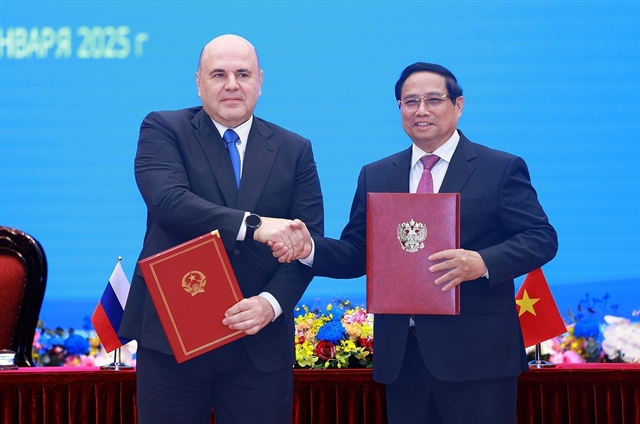
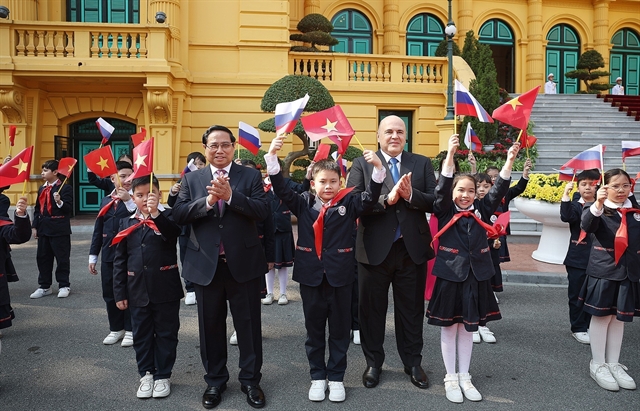
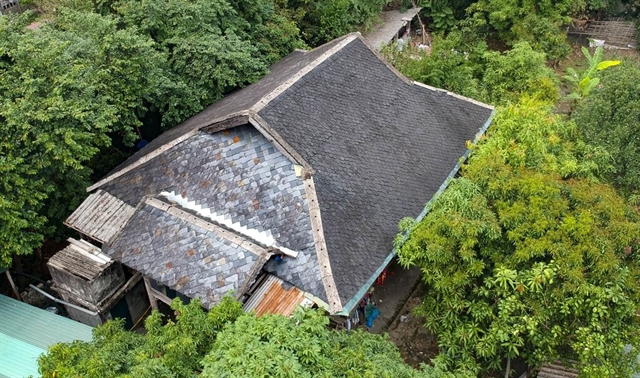
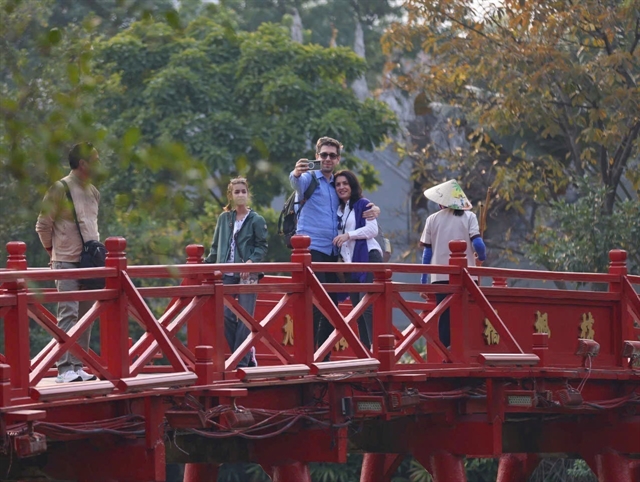
.jpg)
